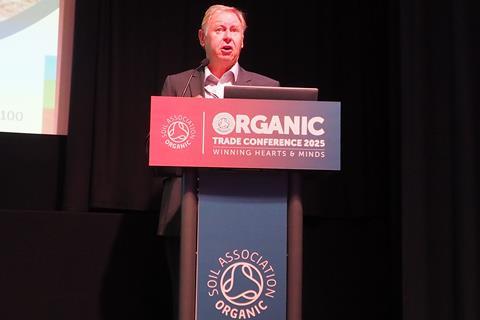While organic sales are holding up well, there are numerous barriers to category growth

Growing the UK’s organic market, alongside policy support for organic farmers and capturing younger people as consumers and producers, is key to ensuring the UK’s food security and resilience.
This was the key message from the 2025 Organic Trade Conference, run by Soil Association Certification, at The Barbican, London this week. The event brought together key stakeholders from across the sector including farmers, retailers, brands, manufacturers and policy experts to ask how organics can “win hearts and minds”.
The event heard how the UK organic market is continuing to grow despite food inflation rising. The latest figures show organic growth is ahead of non-organic at almost double in volume terms – 2.5 per cent vs 0.2 per cent for total food – as well as up eight per cent in value terms compared to 3.5 per cent for total food.
However, while consumer demand for organic remains high, the UK’s land that is farmed organically has stagnated at three per cent, speakers warned, trailing far behind Europe where the EU average is 10 per cent.
Unless more is done to increase organic production domestically, consumers will largely rely on imported organic goods, which does not bode well for UK food security, said Mike Watkins, head of retailer and business insight at NielsenIQ.
Coupled with this, UK agriculture has an ageing workforce, with figures from 2024 showing over a third of all farm holders in England were aged over 65 and just five per cent were under 35.
Engaging younger people
The good news for the organic sector is that younger people are primed to take up the baton of British organic food production, the event heard, as interest in food systems is currently strongest among those aged under 34. A recent survey by ADHB indicates that 58 per cent of 18-24 year olds and 75 per cent of 25-34 year olds have a strong interest or specialist knowledge in farming and food production, compared with 48 per cent of total consumers.
In addition, under 35s overindex in purchases of organic food and drink, with some 55 per cent of under 35s saying that buying organic is important, while the figure is 43 per cent for the total population.
Keeping younger people on the side of organic will require organic businesses to get their messaging right, however. Keynote speaker Solitare Townsend warned organic brands not to be caught up in a “virtue bubble” where they speak only about the good work they do, without any focus on how the product will benefit the consumer.
“Most of the population won’t go for something unless there is a benefit for them – and this is even more pronounced with Generation Z,” she said. “While millennials are more receptive to values-led communications, Gen Z simply want better products.
“Highlighting the functional benefits of organic is what is going to drive people to buy more – whether that’s better health, or better value for money to take two examples. Many brands believe “Organic” on its own is the functional benefit, and that’s not the case.”
“Make your customer feel like a hero. Don’t focus on how your brand, or even brand founder is the hero.”
Barriers to growth
Major structural barriers are currently preventing more young people from getting involved in organic farming, however. The panel “Seeding the future – Inspiring the next organic generation,” featured Olivia James, a former organic farmer. She ran an organic market garden in Devon with her husband until this year, when they became one of 6,000 land-based businesses that had to shut down.
James said the limited financial return on produce made continuing difficult and while she and her husband were farming on land owned by his family, the cost barriers are even more difficult for young people who do not have this land access.
While consumer engagement is important, it can’t solve the issues alone. “We need more policy intervention from government that values and supports organic as well as more market regulation,” she said. ”These need to happen at the same time as growing public awareness and demand.”
Pressure on government
The Soil Association and Soil Association Certification are pushing for action by the Westminster government to expand organic production to fulfil the demand. The Soil Association charity, along with other environmental NGOs including RSPB and National Trust, have called for an English Organic Action Plan in an open letter, which could have a target of increasing the land farmed organically to 10 per cent by 2030.
The conference also heard how data is becoming crucial to adhere to regulatory frameworks and to tell the story of positive impact. Soil Association Exchange has been helping farmers to unlock financial rewards by capturing on-farm data that demonstrates what organic delivers, and this can then be used to help farmers access funding streams.



